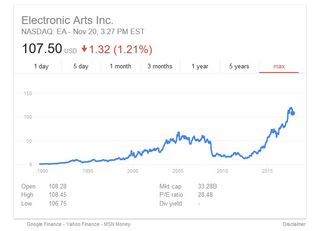Financial analyst says 'gamers aren't overcharged, they're undercharged'
Evan Wingren of KeyBanc Capital Markets says Star Wars Battlefront 2 created a 'perfect storm for overreaction.'

It's always fun to contrast the enthusiast side of the videogame industry—that's us—to the colder, harder business side of things. Take the ongoing Star Wars Battlefront 2 clown show, for instance. Gamers pushed back forcefully against what they saw as egregious loot box overreach, forcing a last-minute decision to remove microtransactions from the game. Victory!
Of course, the removal is only temporary, a point emphasized by EA's follow-up statement that the change "is not expected to have a material impact on EA's fiscal year 2018." Which is what you'd expect the company to say, since the last thing it wants to do is spook the investors. Even so, EA shares have slid somewhat over the past month, but analyst Evan Wingren of KeyBanc Capital Markets believes that's potentially an opportunity for investors—and, more to the point, that the backlash against Battlefront 2 is an "overreaction" amongst gamers and the gaming press, who just don't know how good they've got it.
"We view the negative reaction to Star Wars Battlefront 2 (and industry trading sympathy) as an opportunity to add to Electronic Arts, Take-Two, and Activision Blizzard positions. The handling of the SWBF2 launch by EA has been poor; despite this, we view the suspension of MTX [micro-transactions] in the near term as a transitory risk," Wingren wrote in a note to clients over the weekend, via CNBC.
"Gamers aren't overcharged, they're undercharged (and we're gamers) ... This saga has been a perfect storm for overreaction as it involves EA, Star Wars, Reddit, and certain purist gaming journalists/outlets who dislike MTX."
(The "add to positions" recommendation, by the way, simply means that this is a good time to buy stocks in EA and the rest, because ultimately they will continue to gain value—the implication being that the Great Loot Box Triumph of '17 is in fact just a bump in the road that won't have any meaningful impact on the company in the long run.)
What it comes down to, in Wingren's estimation, is a simple measure of cost per hour relative to other forms of entertainment. He reckons that, at $60 for the base game plus $20 per month in loot boxes, Battlefront 2 works out to about 40 cents per hour if you play for 2.5 hours a day for a year. Compare that to $3 per hour for a movie watched in a theater, and videogames look like a real bargain.
"If you take a step back and look at the data, an hour of videogame content is still one of the cheapest forms of entertainment," Wingren wrote. "Quantitative analysis shows that videogame publishers are actually charging gamers at a relatively inexpensive rate, and should probably raise prices."
The biggest gaming news, reviews and hardware deals
Keep up to date with the most important stories and the best deals, as picked by the PC Gamer team.
"Despite its inconvenience to the popular press narrative, if you like Star Wars and play videogames at an average rate, you're far better off skipping the movie and playing the game to get the most bang for your buck."

Even though I'm a (very small) part of the mighty media machine that's pushed this supposedly ill-informed, anti-business narrative, I can see where Wingren is coming from, up to a point. In 1988, Radio Shack sold King's Quest 4, one of that year's premium games, for $45, just $15 less than what Battlefront 2 is going for now. Compare that to the change in hardware pricing over the years: A 40 megabyte "disk kit" in '88 cost 1400 bucks, and no, there is not an extra zero in there.
So sure, you can argue that game prices have held remarkably steady over the years. But what has changed is literally everything else. It used to be that gamers needed to know which IRQ their sound card was using; now, you're the weirdo in your circle of friends if you don't have a console connected to your flat screen. Accessibility is unprecedented—Steam, GOG, and other services have literally brought massively-stocked stores into your home—and in case you'd forgotten, the industry itself somehow managed to become a multi-billion-dollar entertainment juggernaut while apparently undercutting itself at the same time.
And that doesn't even take into consideration the obvious fallacy of trying to qualify "entertainment" as some monolithic thing with an across-the-board value equivalence. That makes as much sense as telling my mother that she should skip the new Kenneth Branagh flick and start playing LoL instead. "Gotta think about that entertainment bang for your buck, mom!"
In spite of EA's reassurance to investors and the obvious unfairness of it all, Wingren also acknowledged that the backlash means there's a "slightly higher probability" that Star Wars Battlefront 2 won't hit its sales forecast of 13 million units. That will probably make Disney even angrier.
Andy has been gaming on PCs from the very beginning, starting as a youngster with text adventures and primitive action games on a cassette-based TRS80. From there he graduated to the glory days of Sierra Online adventures and Microprose sims, ran a local BBS, learned how to build PCs, and developed a longstanding love of RPGs, immersive sims, and shooters. He began writing videogame news in 2007 for The Escapist and somehow managed to avoid getting fired until 2014, when he joined the storied ranks of PC Gamer. He covers all aspects of the industry, from new game announcements and patch notes to legal disputes, Twitch beefs, esports, and Henry Cavill. Lots of Henry Cavill.
Most Popular



